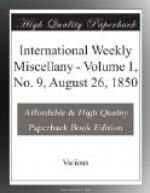late in the evening when he ascended the “stand,”
which was supported by the trunks of two magnificent
forest trees, through which the setting sun poured
with picturesque effect. The ravages of ill health
were apparent upon his face, and his high massive
forehead was paler, and seemingly more transparent
than usual. His audience, some three or four hundred,
was composed in a large degree of his old and early
friends. He seemed to feel deeply, and as there
was nothing to oppose, he assumed the style of the
mild and beautiful—he casually alluded to
the days of his early coming among his Southern friends—of
hours of pleasure he had massed, and of the hopes
of the future. In a few moments the bustle and
confusion natural to a fatiguing day of political wrangling
ceased—one straggler after another suspended
his noisy demonstration, and gathered near the speaker.
Soon a mass of silent but heart-heaving humanity was
crowded compactly before him. Had Prentiss, on
that occasion, held the very heart-strings of his
auditors in his hand, he could not have had them more
in his power. For an hour he continued, rising
from one important subject to another, until the breath
was fairly suspended in the excitement. An uninterested
spectator would have supposed that he had used sorcery
in thus transfixing his auditors. While all others
forgot, he noticed the day was drawing to a close,
he turned and looked toward the setting sun, and apostrophized
its fading glory—then in his most touching
voice and manner, concluded as follows:—
“Friends—That glorious orb reminds
me that the day is spent, and that I too must close.
Ere we part, let me hope that it may be our good fortune
to end our days in the same splendor, and that when
the evening of life comes, we may sink to rest with
the clouds that close in on our departure, gold-tipped
with the glorious effulgence of a well-spent life!”
In conclusion, I would ask, will some historian, who
can sympathize with the noble dead, gather up the
now fleeting memorials that still live in memory,
and combine them together, that future generations
may know something of the mighty mind of Prentiss.
The remains of the orator must ever be imperfect—the
tone of voice—the flashing eye—the
occasion, and the mighty shout of the multitude, cannot
be impressed; but still Prentiss has left enough in
his brilliant career, if treasured up, to show posterity
that he was every inch a man. Let his fragmentary
printed speeches—let the reminiscences
of his friends that treat of his power as an orator,
be brought together, and unsatisfactory as they may
be, there will be found left intrinsic value enough
to accomplish the object. There will be in the
fluted column, though shattered and defaced, an Ionian
beauty that will tell unerringly of the magnificent
temple that it once adorned.
BATON ROUGE, July 9, 1850.
* * * *
*
[FROM HOUSEHOLD WORDS.]




